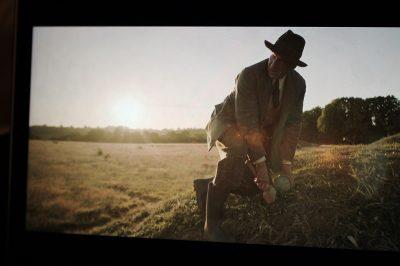Combining the directorial skills of Simon Stone, the screenplay adaptation by Moira Buffini and the cinematography of Mike Eley, “The Dig” portrays a dynamic, true story intertwining themes of history and modern existential longing with dramatic scenes concerning life, death, love and family.

The Netflix film, released Jan. 29, is an adaptation of John Preston’s 2007 novel of the same name and is based on a true story. Taking place in the rustic countryside of Suffolk, England on the eve of World War II, self-taught archaeologist Basil Brown, played by Ralph Fiennes, embarks on a dig to uncover what’s believed to be ancient Anglo-Saxon ruins potentially dating as far back as the Vikings — or further.
The site lies on the vast estate owned by Edith Pretty, played by 2013’s “The Great Gatsby” star Carey Mulligan. Pretty is a widow left with one son and a dream to dig up three large, grassy, hill-like mounds located in the fields. Though the archaeologist is unconvinced there’s anything significant to be found, attempted grave robberies have convinced Pretty there’s something extremely valuable hidden within.
Brown, a local archaeologist with the Ipswich Museum, leads the Sutton Hoo excavation, with Peggy Piggott, played by Lily James. He’s portrayed as a modest working man with vast knowledge of the land. His soil expertise is what leads Pretty to hire him in the first place.
Given the politics of the time period, the dig site is seen as an area of national interest as Britain was preparing to protect the country’s ancient ruins from German air raids.
The story shifts toward a more intimate focus, concerned with family and belonging, when Pretty’s young son Robert, played by Archie Barnes, grows increasingly fond of Brown. The two are portrayed almost as father and son, bringing the narrative closer to one of community rather than national glory.
“The Dig” captures a unique perspective of existentialism, with the story taking place during Britain’s mobilization before wartime. It keeps audiences reflecting on the significance of human legacy, wondering what will be left of us after we are gone.
As the characters on screen are forced to come to terms with their own mortality in an age of destruction and uncertainty, we get a better understanding of the significance of these ancient runes that are still standing — a testament of humanity’s longevity.
Aside from matters of historical and ancestral significance, “The Dig” is a nod to the struggles that affect ordinary people of today, with overtones of love, lust and heartbreak.
What keeps viewers satisfied throughout the film is the unchanging and breathtaking scenery of the Suffolk countryside. Eley yields cinematographic mastery by capturing the lush wheat fields of eastern England, combined with enticing pan shots of the site to emphasize how massive this project is, yet also how seemingly small of a role it plays in the full history of the nation.
Stone keeps audiences holding their breaths by turning a story of national history into a heartfelt drama that so accurately touches on struggles that afflict people of all backgrounds.
It’s worth mentioning the film has received some criticism for sexist portrayal of characters, for ageism — despite the whimsical setting — and for fictionalizing some of the truth.
Be that as it may, it was worth the watch.
At surface level, “The Dig” seems like a story of historical drama, but it takes audiences into deep-cutting, emotionally luring instances of love, loss, triumph and human connection.
















































































































